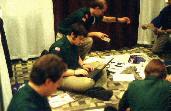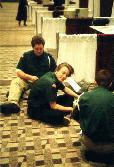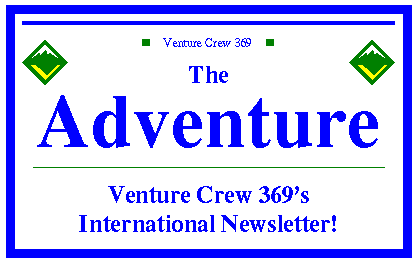(C) Sun Dec 27 14:17:31 EST 1998 Venturing Crew 369
Thank you!James D. CorderVenturing Crew 369 would like to thank Georetiary Networks Inc. of Orlando, Florida. Their generous financial donation not only got 369 out of debt but also filled their floor and electrical fund for our new room addition! The first week in January 1999 formal plans for the two floor, 3 classroom addition to the church will be drawn. Once the church committee approves them then it is off to the City of Columbus for permits. It is in God's Hands, as it has always been! |
Opinion vs. FactJames D. CorderA magazine should be factually correct. However, opinions are not always based on reality. The Adventure is a magazine that is written by High School Youth, and they have editorial rights. One of 369's goals is to teach technical documentation, a necessity if you are going to be a UNIX System Administrator. Therefore, all youth have to begin somewhere. The Adventure is a good place to start! However, we would appreciate if you would e-mail the youth at exp369@www.venturingbsa.com and inform them of YOUR opinions. They must feel the sting of criticism so they will be able to face it later when their jobs are dependent upon it! |
Calendar of Events:1/5/99 Happy 5th Birthday 369 1/5/99 Munchie Night 1/16-17/99 Ski Trip 1/19/99 Meeting at Donatos 1/22-24/99 Campout $20.00 1/23/99 Articles Due 2/6/99 Court-of Honor & Sleep Over 2/7/99 Scout Sunday $7.00 2/20/99 Articles Due 3/6/99 Trip to Air Force Museum 4/20/99 Flower Sale Begins 4/17/99 Rappelling Outing 4/23-25/99 Campout 5/15/99 Garage Sale 6/28-7/31/99 Summer Camp We might move to the following week-$175.00 9/14/99 First Nighter The 1999 Calendar is still in the planning Stages. |
Quote of the MonthGeorge Bernard Shaw"Reasonable people adapt themselves to the world. Unreasonable people attempt to adapt the world to themselves. All progress, therefore, depends on unreasonable people." JokeMicrosoft announced today that the official release date for the new operating system "Windows 2000" will be delayed until the second quarter of 1901. Young EntrepreneursJames D. CorderVenturing Crew 369, on behalf of the Exploring Division of the Simon Kenton Council was requested to be apart of the Junior Achievement's [JA] Young Entrepreneurs' Convention. I am immensely proud of our youth. They where extremely well behaved and presentable. When the uniform of the day was a suit and tie, it was nice to see 369 proudly in their dark green BSA uniform. There were six seminars: Entrepreneurs, Start-Up, Marketing, Business Plans, Bookkeeping, and Finance. 369 had representatives attending all of them. During the breaks, in-between sessions, attendees could wander the convention floor. All of the presenting booths featured young men and women who started successful business while still in school. The youngest Entrepreneurs there were two 11 year olds. I was impressed with these two. Since 369 creates future UNIX Consultants we where asked to have a booth also. 369 was honored to oblige! Many in Crew 369 grasped the opportunity at hand, some even took advantage of it! |
An ApologyJames D. CorderLast month's issue of The Adventure was titled "Solaris 7". We are sorry that the Solaris 7 article did not make it in the newsletter. |
Nationwide InsuranceJames D. CorderNationwide Insurance's VP Steve Lundregan has agreed to start at least 3 Youth Mentor programs within Nationwide following 369's forum! |
 More Pictures Junior Achievement ConferenceHo-Sheng HsiaoWalking through the Greater Columbus Convention Center for the Junior Achievement Conference, I felt out of my depth. It wasn't because of the building. Sure, the building was big. But the people I was rubbing elbows with were bigger. Greater. Mr. Corder, our Crew advisor had spoke once about how the people we surround ourselves with truly shape how we view the world. "You want to be a millionaire?" he asked once. "Go hang out with millionaires." It was one thing to hang around someone like Mr. Corder; walk around the Junior Achievement Conference to see what I mean. I was surrounded by an ocean of greatness. At that point, I could feel overwhelmed, or I can feel challenged. Sink or swim, bub. With these eyes, I attended the start-up seminar. Late. I hear this remarkable man speak. "I used to be a teacher, but I was only making forty grand a year. So I went into business for myself." He spoke about looking for entrepreneurs here at the conference, about giving jobs to youths while showing them how to start and organize a business. He spoke about opportunity. "You see these booths set up here? They started when they were in high school, and planned for years." Now, they were here. He spoke about great many things. And when he ran out of things to say, no one really made any moves to get up. So he dismissed us. He is still a teacher. And just like walking late to the seminar, I seem to be walking late into these opportunities. Sure, I've tried setting up my own business -- fell flat on my face -- though I will still try again. I am trying again, today. I hear that teacher, his words practically shouting out here's a chance! Take it! And I watch students around me take notes. For a school assignment. I spoke with the Westerville Graphix team. This little business, helped out by Junior Achievement, creates, markets, and sells T-shirts and sweat-shirts for Westerville. I asked them if they considered expanding the market. They had considered, but had other commitments they felt were more important. Yeah, they tell me, they tried, but with sports, and you know, "other stuff." The chief spokesman surprised me. She tells me doesn't want to go into business. That's too bad; she made a good spokesman. She had put opportunity, even great opportunity, within perspective. I walked in feeling close to overwhelmed. I didn't walk out feeling challenged. Sink or swim, I know where I'm going. Right here. I'll build an island, a haven, a place where others may swim to. I walked out resolved. |
Finance SeminarNathaniel GrahamAs part of the Junior Achievement convention, there were several business seminars. This is a brief synopsis of the finance seminar that I attended. Your business' financial needs can be assessed best by adding together all of the costs required run it. (numbers are arbitrary)
---------------------------------------
Cost Description
---------------------------------------
$ 1,000.00 Rent
$ 200.00 Overhead
$ 500.00 Loan Payment
$ 8,000.00 Salaries
$ 5,000.00 Cost per unit * 1000 units
etc. etc.
$100,000.00 Total
---------------------------------------
Your monthly income must at least be equal to the final cost of running your business Financing can come from several places: 1. You 2. A relative or friend 3. A bank 4. A loan program or some other creditor 5. Investors Most start-up capital comes from 1 and 3, while almost all corporations acquire financing from both 3 and 5. There are two major differences between a bank and other creditors: 1. The amount of capital available 2. The difficulty of obtaining capital While banks will be able to provide larger amounts of capital (sometimes several orders of magnitude), it is usually more difficult to convince them to finance you in the first place. Loan programs will generally take anything that can be sold as collateral (say, a baseball card collection), while banks tend to focus on things like cars, houses, boats, etc. Marketing SeminarNathaniel GrahamWhat is marketing? The process convincing someone to by something (greatly shortened, but basically true). What steps does marketing usually entail? Conception (of an idea), Pricing, Promoting, and Distribution What are some key components of marketing? Financial Analysis: How much a product will cost to produce, how much it costs to promote, how the cost effects the product's price Market Opportunity: Is there a need that isn't being filled?, setting your products apart from competitors' Some Key Principles for Success in Marketing
Who is involved in marketing? Everyone. You sell an employer on hiring you, a girl on going out with you, the population on electing you, organizations on supporting you, etc. If you can't handle selling yourself to other people (not literally!), you might as well go live in a cave.... |
 More Pictures What is Marketing?Jesse KassA common misconception is that marketing is nothing more than advertising. In truth, it is far more than that. Marketing fulfills the fundamental role of selling products, however it is even more than that. Marketing is the art of persuasion. Good marketing requires an intimate understanding of the product. One must know the purpose of the item - what does it do? It is also important to know how the product compares with its competitors. Is it the economy brand or premium brand. This information forms the foundation of the marketing of your product. If you don't know what is, then how are you going to sell it? Once you understand what the product is, you must then decide who it is being sold to. This is very dependent on the specifics of your product. Ford trucks are aimed at a market very different from that of limousines. The cost and function of your product are important determiners in deciding your target market. This decision is very important and must be done carefully to prevent potential disaster. The elderly will not buy Mortal Kombat regardless of how good the advertising is. Once you've decided on your target market, the next step is to decide how your product will be advertised. This depends on both your budget and your target market. If your target market is large, you will probably be using mass media - television, newspapers, the radio, etc. On the other hand, if your product is highly specialized, then you may just want to send a business representative to your potential clients. You also want to consider the likes and dislikes of your audience. Advertising aimed at teenagers is very different from advertising aimed at baby-boomers. Good marketing can have a huge impact on the success of a product.
Consider Coke for example. It is little more than sugar water, yet
this product is recognized world-wide and all most everyone drinks it.
But good marketing skills have applications beyond business. We, as
people, are marketing all the time. When you apply for a job or try
to get a promotion or even ask someone for a date, you are marketing.
Marketing is a skill of nearly universal applicability which everyone
should be at least proficient in.
|
Falling Flat in the Snow, JA ConferenceHo-Sheng HsiaoIt was cold, so a group of friends sat down at a Barnes and Nobles cafe. Some of them got drinks, others just sat, lost in thought. This group wanted to start a business. It was to create web design. It was to create graphics. It was to create computer games. There were mention of consulting. There were many things. One outsider, still a friend but with no interest in the business, expressed extreme doubt. "You know, you guys aren't going to make any money." To the people there that day, myself included, we just had to show that we could. We went as far as establishing a location, setting up a site, critiquing other people's site, even finding some clients willing to pay some cash for their page. Six months later, we had three new members, one drop-out, nothing in our portfolio, no cash to work with. Two months after that, the group decided to de-emphasize the money-making and leave the organization alone for a while. Why did we fail? How did I, as a member of this group fail? I see three primary (there were others) reasons, two of them I am directly responsible for: Lack of teamwork -- none of us really committed ourselves to the team. Furthermore because I brought in new members too fast, we ended up spending time resolving conflicts. Conflicts are not necessarily bad. It usually brings fresh perspective on problems. If they are resolved to the satisfaction of everyone involved. It took me too many tries for me to learn that lesson; we ended up with high defensive barriers, lack of trust, and a group of people with non-existent teamwork. Lack of leadership -- no focus, no plan, no execution -- we didn't know what we wanted to do. There were no plan of action. Or at least, there were no plan of action that satisfied everyone. So while we might have some vague notion of a plan -- yeah, we need to get this page done -- not one of us was personally committed to and actively involved with what the group should produce. Take me, for example. I had written and laid out some sample client pages. But I did it, without thought or care for the group itself. Another person genuinely cared for the group, but because I was ignoring him, I created an environment that discouraged him from actually being actively involved. As you see in our case, this lack of leadership is actually both a symptom and a cause for the lack of teamwork. Lack of capital -- one easy, key indicator that was only obvious (to me) on hindsight. We didn't have enough to establish a presence, nor did anyone feel they had some stake. It was like (at least for me) trying to milk the cow without putting her to pasture! I am currently involved with few projects where it will bear some fruit in the future. (And I can hear the groans from some of my friends). I can and will apply all of these lessons learned from the first try. This includes getting the plan together, and a team willing to personally commit his time -- including me! -- before going "official." One other lesson: these hindsight discussed here in the article came in part from advisors. To succeed, one really needs to have mentors. Our group, right now, is concentrating on our own internal projects first. Eventually, you might hear from us. |
 More Pictures From Unskilled Labor to Unskilled ManagementHo-Sheng HsiaoAbout seventy years ago, American investors watched in horror as high-flying stocks crashed down like an avalanche. Average, hard-working Americans woke up the next day to Black Tuesday, hundreds of millions of dollars in savings were wiped out when stock-gamblers -- often middle-class themselves -- were unable to pay back loans. Bankers over extended themselves. Banks loaned out more money than they had on-hand. When depositors wanted to remove their money, there was not enough on-hand. A panic issued and therefore a run on the bank. The period marked what we call today, the Great Depression, or first and last. We'll never call another such experience a "depression" any more. I like the affluent life that surrounds me today; Few today are willing to give up affluence. Today's affluence were the result of visionaries -- yes, some greedy, but many often too are people serving for a better America. These visionaries established organized capital. Organized capital emerged from a need to coordinate American railroads, and spread to other national enterprises. It separated a corporation into owners, managers, and labor. The industrialization and mechanization created a large working social class -- and slowly squeezed them. This working class, the basis for the entire consumer economy slowly lost their purchasing power. With the consumers-good manufacturers over-producing with little thought to long-term growth, the economy went into a downward spiral. Even without the stock market crash, the Great Depression would have happened any ways. It was the backlash of a shift in the way economics works, shifted by the forces of industrialized consumer-goods. Today's shift, like that of the three-hundred-some years of global industrial development will once again significantly impact our global community. Its target? The managers. The middlemen. The re-sellers. The agents. The white collared sales and marketing staff. Who are replacing the human corporate bureaucracies? "Smart" software agents. From that heavily corporately-funded MIT Media lab, these agents roam the on-line information systems in search for products to buy and sell. That's just the start. All done automatically and autonomously, free your time. Amazon.com is now expanding its "recommendation engine" to assist consumers in browsing their huge database. Axicom owns enough information (to the extent that anyone -can- own information) from sites such as bigfoot.com to target consumers -- massively, cheaply, and effectively. Automatically. Autonomously. Look at portal sites such as Yahoo!; they intend to customize a consumer's information gateway -- and while we're at it, customize those annoying advertisements. Again, automatically and autonomously. That sounds great, doesn't it? I can worry about more important things. There are flaws -- tanstaafl(1) kicks you when you're not looking. Wired 6.12 (E-commerce section) reports "Shopbot Pandemonium." IBM ran a market model where "bots" make purchasing and selling decisions. Bots, within the Internet community, refers to software agents acting on your behalf, autonomously. They created a simulation where there are only bots buying and selling in a market. They found "periods of relative calm and brief prosperity for the [sellers] punctured by violent, sporadic price wars." Often, the report goes on, sellers engaging in price wars "retreat from the general market into narrow niches." While Wired reports this with a tone of astonishment, this is actually normal in such systems, with thirty years of research behind it. (These are called complex systems, for the curious, and www.santafe.edu has plenty of resources available). Such behavior described the period of rampant and unregulated monopolies during the Gilded Age. And we know what happened with that economy -- no one understood it enough to care. Yet software agents make "decisions" and act on them at far greater speed than humans. With the Internet levelling the playing field in terms of presence, the bizarre crowded with both local and global vendors, why wouldn't you have software agents search and purchase on your behalf? Much like the pressure to cut costs when consumer-goods manufacturers switched to assembly-lines, few would be willing to give up software agents. Especially not when it reduces costs. Take the next economic growth over the Internet, for example. Fortune magazine's E-commerce issue reports that the real money is in the producer market. The large transactions occur between companies -- massive furniture sales, for example, or large publishing orders. Hypothetically, with software agents a procurer responsible for furnishing the office building can set her software agent to find the cheapest and most convenient source of furniture from hundreds or thousands of vendors. That's the buyer. With companies using software agents to probe the market and find what they want, with hundred-billion transaction records holding probing and buying trends, a marketer uses software agents to design, research, and report on buying trend. At that point, you might as well plug in that data into agents responsible for deciding what to manufacture and what to sell. We have the seller. All conveniently automatic and autonomous. Might as well throw in finance automation. Cut costs, ditch all your staff members, ditch your managers, and use the bots. Run the whole corporation with bots. Even though the technology would mature, the bots will become more flexible, we would have those economic hiccups. Remember that IBM simulation? Computer software agents are not as fluid in their decisions. An economy ran by these software agents is a scary sight. Despite their inflexibility, bots are still more efficient. It costs less. The potential is there-- or else we wouldn't have the MIT Media Lab, Amazon.com, Yahoo!, IBM all rushing to develop this technology. Like the machines that replaced human physical flexibility, software will replace human mental flexibility. Blue-collared became displaced by or enslaved by machines; white-collared will become displaced by or enslaved by software agents. Unskilled labor operate automated machinery; unskilled managers will operate automated agents. Who is next, the owners? I am not a technophobe -- I would not have joined the UNIX Crew if I were, and I wouldn't be tracking these ideas if I were. I really enjoy my affluent life, and I've benefitted greatly from the inspirations and sweat, tears and blood of the global, industrial society. I know down the road, I or someone else, millions or billions of people will enjoy the benefits of an information society -- automated information society. With the benefits, however, I must also act responsibly. I don't want business to become an empty, computer-automated bureaucracy, even if it seems inevitable. We've lived with the flaws of industrialization. We've compromised. I think there is a solution to the problems of a jacked-up Internet society, and we can find it, and implement it. We can act responsibly. But how? I don't know, do you?
 More Pictures |
The Advanced Encryption StandardNathaniel GrahamSince the introduction of DES (or the Data Encryption Standard), people have been looking for an algorithm that offers better security and performance than the standard. Today, DES is still the standard, but DES has become increasingly vulnerable to brute-force attacks as computers become more powerful. So NIST (National Institute of Standards and Technology) has begun the process of adopting a new standard, to be referred to as AES, or the Advanced Encryption Standard. The requirements, as posted earlier this year, were: 1. The algorithm must be a block cipher that operates on 128 bits per block 2. The algorithm must have possible key lengths of at least 128, 192, and 256 bits 3. The algorithm must be implementable on 8 bit processors and in hardware 4. The algorithm's authors must be willing to make the algorithm free (in most senses of the word) if it is selected as the AES Authors had to submit the following: 1. A detailed and technical description of the algorithm, from which code could be written to implement it 2. A reference implementation in ANSI C 3. An optimized implementation in ANSI C 4. An implementation in Java(tm) 5. Test keys and clear-text/ciphertext pairs for debugging and such The following are the candidates, with their authors:
What is the American Dream?Dennis FoxIs it a white picket fence in the middle of a suburb in small town USA? Is it a material possession or a state of mind? Maybe it isn't one or the other but instead both. Maybe it is the realization that the only helping hand that you need is at the end of your arm. It is the spirit of our forefathers that has become impotent today. I was raised in a family of entrepreneurs. My father always told me that from the chin down a man is worth a dollar a day but from the chin up the sky is the limit. You will always make more money with a pen than you will with your hands. I realized that most rich people don't have jobs. They work for themselves. They are the risk takers. They get ahead because they are willing to do what others are not willing to do. They take the initiative to take control of their destiny. I always wanted to be my own boss. I wanted to fulfill my own dreams rather than be a drone. It is for this reason that I went into business for myself. I am not saying that it is easy but instead I am saying that it is worthwhile. I work hard for my goals. I do more than the average employee does because I have a vested interest. If I am to succeed or fail it is up to me, along with my work ethic and the blessings of God. I am so proud do be associated with my Venturing Crew because they think like me. It is because of them and people like them that our country has hope. If our country is to continue to be successful it is up to the youth. I am proud that our Crew was invited to the Junior Achievement's Entrepreneur Day. It shows the quality and standards that we live up to. ArlingtonianNeil CoplinFinal deadline in ten minutes! Its the end of another issue of the school newspaper. All the hard work will be going out to press, soon to be subject to the eyes of the rest of the school. Most of the writers are wondering how their stories look. Not me though, the people doing the worrying for me are the advertisers. Being the Advertising Editor for the Arlingtonian, our school newsmagazine, will soon become a thing of the past. It all started my freshman year, when my brother began to look for a replacement since he was graduating. Naturally, since he knew that I could do it, and had the time, he convinced me to pick up an application. Getting the position on the paper was possibly the easiest thing that I have done, since I was the only person applying. Sophomore year rolled around and I didn't feel at all ready for jumping into the swing of things. My brother hadn't trained me as much as I would have liked over the summer, and now he was off at college. I didn't seem to be alone though; about half the staff was new that year. After getting acquainted with everyone, it was time to get down to some serious work. There was a huge pressure on my shoulders that first month. The entire paper depended upon me. If there were no advertisements sold, there wouldn't be a paper that month. I knew that I had to do it. I had always been a rather shy person before then, but that had to change. Talking to strangers over the phone was hard. Convincing them that advertising will help their business was even harder. The strange thing was that if I talked to someone in person, it was harder for me to gather my wits to do it, but it was harder for them to say no. I was fortunate though, since my staff was far better at this than I. The money came pouring in and my concerns faded. I knew I could do it. However only half the job was done. Now I had to make sure that their advertisement worked. One of my duties was to get money for the paper. The other was to get money for all of the businesses that advertised with us. Fortunately this wasn't as hard for me as selling the advertisements. In fact it came rather naturally, winning myself several awards for my design work along my tenure in the position. Now three years have almost gone by since I took up the position, and it has been a major influence on how I am today. Not only has it helped with social skills by talking with complete strangers, but dealing with money and harder times as well. Things can go bad. Oh well. There will be plenty of things that go your way to make the bad insignificant if you do things right and have the determination to do them. Taking a business, no matter what level it is at, into the future is one of the most unique things that I have ever done. I will do it again. But now I have to move on. But there is one thing left to do. There needs to be someone else to carry the paper on to the future, least it die out completely. Just because one person leaves, the future does not have to go as well. |
Post Finances
|
Up-an-Coming Crew Expenses
Up-an-Coming Member Expenses
|
||
This page has been accessed $pagecount"; ?> times. Since Sun Dec 27 14:18:15 EST 1998

 Young Entrepreneurs
Young Entrepreneurs
